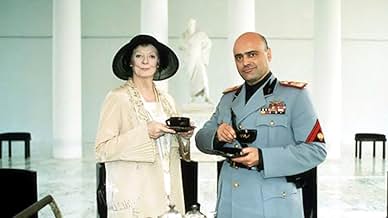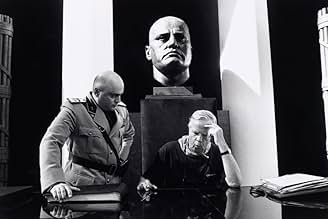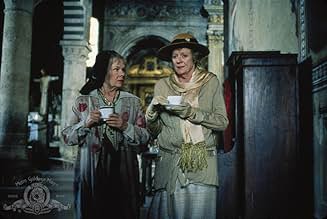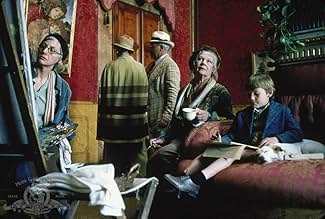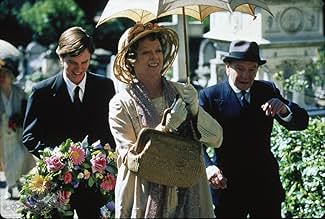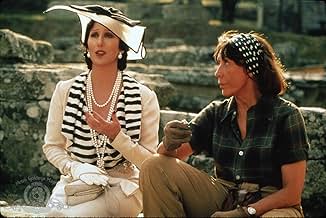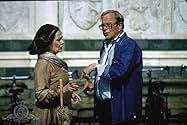IMDb रेटिंग
6.9/10
15 हज़ार
आपकी रेटिंग
अपनी भाषा में प्लॉट जोड़ेंAn orphaned Italian boy is raised amongst a circle of British and American women living in Mussolini's Italy before and during World War II.An orphaned Italian boy is raised amongst a circle of British and American women living in Mussolini's Italy before and during World War II.An orphaned Italian boy is raised amongst a circle of British and American women living in Mussolini's Italy before and during World War II.
- 1 BAFTA अवार्ड जीते गए
- 5 जीत और कुल 3 नामांकन
फ़ीचर्ड समीक्षाएं
See comments by obo-3. I have to agree on many of those weaknesses, although I have a talent for suspending my disbelief in order to appreciate some finer qualities of a movie. This didn't receive a very high rating from me, however, I have stringent guidelines.
I do think it is worth seeing merely because it does a good job of showing us a different perspective. For our generation to look back into history and judge those who were naive as doing nothing to stop the atrocities... I do not make excuses for those who saw the horror with their own eyes and turned away, or worse, gave up their neighbors... But for example, in this movie, when the local military knocks the town around a bit, some of the fine British believed it to be an isolated incident and just didn't believe that Jews were really being rounded up and carted away like livestock elsewhere. They trusted the word of Mussolini and believed in the greater good of the governments and aristocracy of the time.
This is a touchy subject, but in our age of media coverage, even I doubted the stories I read in the paper of the atrocities in eastern Europe and thought it may be propaganda and overblown. I just couldn't believe it what was happening in our modern times and in Europe. This disbelief was coming from an educated person (in political science, no less) who knows a bit of history. I still could not believe that was happening, until I saw the pictures of the refugee camps and the burned out homes with my own eyes, and finally, until I shared a flat with a man whose parents and child were driven from their homes. I can fully believe that some Europeans at that time, would not see the big picture to stop Hitler and his cronies until it was all too late. It frightens me, even to see how easy it happened.
It is worth seeing this movie just to understand the perspective of how quietly and quickly the Nazi/fascists did what they did.
I do think it is worth seeing merely because it does a good job of showing us a different perspective. For our generation to look back into history and judge those who were naive as doing nothing to stop the atrocities... I do not make excuses for those who saw the horror with their own eyes and turned away, or worse, gave up their neighbors... But for example, in this movie, when the local military knocks the town around a bit, some of the fine British believed it to be an isolated incident and just didn't believe that Jews were really being rounded up and carted away like livestock elsewhere. They trusted the word of Mussolini and believed in the greater good of the governments and aristocracy of the time.
This is a touchy subject, but in our age of media coverage, even I doubted the stories I read in the paper of the atrocities in eastern Europe and thought it may be propaganda and overblown. I just couldn't believe it what was happening in our modern times and in Europe. This disbelief was coming from an educated person (in political science, no less) who knows a bit of history. I still could not believe that was happening, until I saw the pictures of the refugee camps and the burned out homes with my own eyes, and finally, until I shared a flat with a man whose parents and child were driven from their homes. I can fully believe that some Europeans at that time, would not see the big picture to stop Hitler and his cronies until it was all too late. It frightens me, even to see how easy it happened.
It is worth seeing this movie just to understand the perspective of how quietly and quickly the Nazi/fascists did what they did.
After nearly 20 years as a top pop and television star, Cher suddenly skyrocketed to film stardom in the mid-80's, walked off with an Academy Award, ranked among the top ten box-office stars and just as suddenly disappeared from the big screen in 1991 after one last hit "Mermaids"(1990) cleaned up at cinemas. In 1999 she made a tremendous comeback with a multimillion selling CD "Believe"(Warner Bros, 1998) and most impressively returned to the big screen with a luminous performance in Franco Zefferelli's "Tea With Mussolini"(MGM,1999). Reviews were mixed but after I saw this in the movie theater, I felt the film was rather good. Based on an autobiography by Zefferelli recounting his early years trying to survive the Nazi-Mussolini atrocities of WWII. During this dangerous time Zefferelli was protected by a coterie of socialite dowagers played splendidly by Maggie Smith, Judi Dench, Joan Plowright, Lily Tomlin and of course Cher who was perfectly cast as a gorgeous Jewish chanteuse. The story has some holes and the film was probably edited down too much for its US release that cause some continuity issues but this is overall a charming, thoughtful period piece highlighted by Cher at her latter day peak. Shame this success did not resuscitate her dormant film career. She has made nothing of note since.
This film is one of the most touching and lovely films that I have seen in many years. Its gaggle of actresses are second to none and turn out excellant performance, Joan Plowright in particular brings an irresistable sweetness to the role. People who have commented on the film so far seem to have neglected to mention the soundtrack which is beautiful and inspiring with a wonderful piano piece. Criticism that the film is too old fashioned or that the characters are unappealing and pompous seems to miss the point, the very charm of Hester (Maggie Smith in particular)is how she overcomes her snobbery at the end and realises how much Elsa (Cher, who in any other film would doubtless be misplaced but in this case fits the role like a glove) has done for the Scorpioni. In short the film is a relic of a gentler age and is simultaniously uplifting, upsetting and relaxing. I implore everyone to hunt down the soundtrack on CD to the ends of the earth if necissary.
This is a very European movie. Whereas Hollywood overstates, Europe understates. The story is based on the autobiography of Franco Zeffirelli, born in 1922, who became a prominent Italian stage director and achieved world fame as a director of filmed stage pieces such as "Romeo and Juliet," "Hamlet, and "La Traviata." The film deals with the years 1935-44. After the death of his mother Zeffirelli, or Luca in the film, an illegitimate child more or less rejected by his father, was looked after by a group of eccentric art-loving English ladies who had made Florence their home - on their terms. The locals call them the "Scorpioni" - a tribute to their acid tongues. When Mussolini declared war on Britain in 1940, the ladies were interned in a beautiful mountaintop village near Florence, guarded by a couple of long-suffering policeman, their lifestyle of sketching, painting, art appreciation and fine dining scarcely changing.
The setting is the Florentine treasure troves of Tuscan art, the Uffizi, Il Duomo and the Academy. The English are led by three grand dames of the theatre, Joan Plowright as Arabella, Luca's chief protector, Maggie Smith, and Judy Dench (with her real life husband Michael Williams in a supporting role as the British consul.). Then there are two equally larger than life Americans, a retired but still glamorous movie star played by Cher, and a bike-riding lesbian archaeologist played by Lily Tomlin. Most of the Italian characters are overshadowed by all this Anglo ego. (Or maybe it's just poor dubbing, or John Mortimer's part in the scriptwriting). The two boys playing Luca at different ages are good looking but the older one in particular is a bit vacuous, and Cher's impossibly handsome Italian boyfriend puts in a wooden performance.
There are a couple of plot-lines (will Cher escape the Jewish round-up, will the ladies make it through the war OK) and the occasional funny scene but the interest is really in the characters. Not that all of them are particularly attractive people. Maggie Smith's Lady Hester, widow of a former British Ambassador to Italy, is a dreadful old snob with hardly any brains who likes the fascists and has scarcely a good word for anybody else except her late husband. She engineers the tea party with Il Duce, fondly imagining that Mussolini himself will ensure the ladies' safety in Florence. A few days later the local fascists tip them out of the Uffizi gallery where they were accustomed to take tea while they sketched the old masters. Yet at the end she does show a little genuine good grace when she intervenes to help Cher.
It's a curious piece, reminiscent of "Life is Beautiful" - a light comedy with a deadly serious titanic struggle between good and evil going on in the background, a background which seems altogether too gorgeous to accommodate such evil. Good, represented by a Scottish major, triumphs in the end, only to be put in his place by the Scorpioni. Zeffirelli here pays his artistic and personal debt to them. Wacky though they were, the Scorpioni did know the difference between good and evil, or at least the difference between good art and bad art, and they taught Zeffirelli well.
The setting is the Florentine treasure troves of Tuscan art, the Uffizi, Il Duomo and the Academy. The English are led by three grand dames of the theatre, Joan Plowright as Arabella, Luca's chief protector, Maggie Smith, and Judy Dench (with her real life husband Michael Williams in a supporting role as the British consul.). Then there are two equally larger than life Americans, a retired but still glamorous movie star played by Cher, and a bike-riding lesbian archaeologist played by Lily Tomlin. Most of the Italian characters are overshadowed by all this Anglo ego. (Or maybe it's just poor dubbing, or John Mortimer's part in the scriptwriting). The two boys playing Luca at different ages are good looking but the older one in particular is a bit vacuous, and Cher's impossibly handsome Italian boyfriend puts in a wooden performance.
There are a couple of plot-lines (will Cher escape the Jewish round-up, will the ladies make it through the war OK) and the occasional funny scene but the interest is really in the characters. Not that all of them are particularly attractive people. Maggie Smith's Lady Hester, widow of a former British Ambassador to Italy, is a dreadful old snob with hardly any brains who likes the fascists and has scarcely a good word for anybody else except her late husband. She engineers the tea party with Il Duce, fondly imagining that Mussolini himself will ensure the ladies' safety in Florence. A few days later the local fascists tip them out of the Uffizi gallery where they were accustomed to take tea while they sketched the old masters. Yet at the end she does show a little genuine good grace when she intervenes to help Cher.
It's a curious piece, reminiscent of "Life is Beautiful" - a light comedy with a deadly serious titanic struggle between good and evil going on in the background, a background which seems altogether too gorgeous to accommodate such evil. Good, represented by a Scottish major, triumphs in the end, only to be put in his place by the Scorpioni. Zeffirelli here pays his artistic and personal debt to them. Wacky though they were, the Scorpioni did know the difference between good and evil, or at least the difference between good art and bad art, and they taught Zeffirelli well.
This film is directed and co-authored by Franco Zeffirelli, and I couldn't resist speculating on how much of it was actually true, since it is said to be based on Zeffirelli's autobiography. However, true in part, true completely, in the end it doesn't really matter. What matters is the amazing ensemble acting by Maggie Smith, Cher, Joan Plowwright, Judi Dench and Lily Tomlin (listing them in the order of significance to the story) and the stunning beauty of Florence where the film is set. The director and photographer plainly love the city, matching the love for it of the characters. Maggie Smith as the widow of a former British ambassador, the character that actually has tea with Mussolini, is the dominant figure in the film. However, Cher, playing a wealthy American -- vulgar in the eyes of he British ladies -- who turns out to be a complex, philanthropic Jew who must be smuggled out of the country in the end; Joan Plowwright as a kind lady who takes in the bastard son of an Italian businessman and teaches him to be an English gentleman; Judi Dench as an eccentric artist whose passion is to preserve a renaissance fresco from the Nazis during the war, and Lily Tomlin as a lesbian American archaeologist all deliver sterling performances. Cher's performance is the most amazing -- she holds her own in formidable company -- but one expects, of course, to be dazzled by Maggie Smith, Joan Plowwright, Judi Dench and even by Lily Tomlin. It's a sentimental, even melodramatic, tale, but see it for the ensemble acting. I can't think of another film that equals Tea with Mussolini in that respect.
क्या आपको पता है
- ट्रिवियाCher has stated that the only reason she took the part of Elsa was because Writer and Director Franco Zeffirelli said he could only see her and no other actress in the role.
- गूफ़The tanks the Germans ride in are, in fact, U.S. Army M4 Shermans, not German-built Panzers.
- भाव
Lady Hester: The Germans and the Italians couldn't get rid of us. There is absolutely no reason why we should surrender to the Scots.
- इसके अलावा अन्य वर्जनThe MGM DVD, ISBN 0-7928-4300-2, is missing least one shot: The original tea with Mussolini scene ends with Mussolini forcing himself upon the reporter, forcing her onto his desk (i.e., he rapes her.) This DVD omits that ending and leaves the reporter's change in behavior unexplained.
- साउंडट्रैकMattinata Fiorentina
Written by Giovanni D'Anzi (as D'Anzi) and Michele Galdieri (as Galdieri)
Performed by Alberto Rabagliati
टॉप पसंद
रेटिंग देने के लिए साइन-इन करें और वैयक्तिकृत सुझावों के लिए वॉचलिस्ट करें
- How long is Tea with Mussolini?Alexa द्वारा संचालित
विवरण
- रिलीज़ की तारीख़
- कंट्री ऑफ़ ओरिजिन
- आधिकारिक साइट
- भाषाएं
- इस रूप में भी जाना जाता है
- Tea with Mussolini
- फ़िल्माने की जगहें
- उत्पादन कंपनियां
- IMDbPro पर और कंपनी क्रेडिट देखें
बॉक्स ऑफ़िस
- बजट
- $1,20,00,000(अनुमानित)
- US और कनाडा में सकल
- $1,44,01,563
- US और कनाडा में पहले सप्ताह में कुल कमाई
- $16,33,183
- 16 मई 1999
- दुनिया भर में सकल
- $1,44,01,563
- चलने की अवधि1 घंटा 57 मिनट
- रंग
- ध्वनि मिश्रण
- पक्ष अनुपात
- 1.85 : 1
इस पेज में योगदान दें
किसी बदलाव का सुझाव दें या अनुपलब्ध कॉन्टेंट जोड़ें



